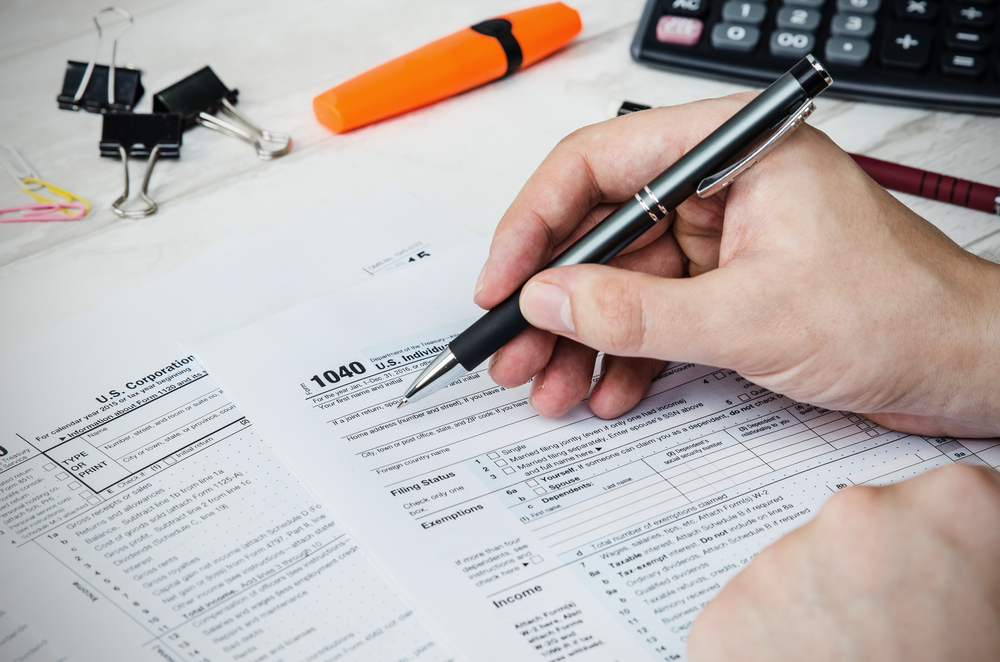Written by: Jacob Dayan
Filing your taxes under any circumstances can be tricky, but when it comes to your business, the process can become even more complicated. Whether it’s your first or tenth time doing your taxes as an independent contractor, you could likely use some pointers, especially because there are high stakes when it comes to doing your taxes correctly.
But don’t worry, we have you covered. We’ve put together a comprehensive guide on the ins and outs of filing independent contractor taxes. This way, you can make sure you stay in good standing with the IRS and have plenty of time to plan ahead.
We’ve answered your most pressing questions about paying independent contractor taxes so you can feel confident about what and how much you need to pay. Let these links be your guide:
What is an independent contractor?
How do you know if you have to pay independent contractor taxes?
What taxes do independent contractors pay?
Tax deductions for independent contractors
How to file taxes as an independent contractor
How do you pay taxes as an independent contractor?
Other independent contractor tips
Not sure what it means to file your taxes as an independent contractor? Before you start preparing your taxes, you need a clear understanding of where you stand in the eyes of the IRS. So, first things first, how do you know if you qualify as an independent contractor?

An independent contractor is defined as an individual (or entity) who has been contracted to perform work for another entity without becoming an employee. So basically, it boils down to contracted work where the entity or individual who has hired you has control over the end result of your work or services, but not how you go about doing it (when and how you choose to work).
For example, let’s say you run a small construction business and a local school hires you to make an addition to their building for more classes. The school district will control what you build (the addition with the new classrooms), but you’ll have control over how and when you’ll build it (the hours and methods of building the addition).
Independent contractors are often referred to as freelancers or self-employed workers. However, it’s important to note that independent contracting is just one of the ways you can be self-employed.
While you might automatically assume that you’re not an independent contractor because you’re not a freelance writer or graphic designer, think again. Many common professions fall into this definition, including doctors and lawyers.

The way your business is structured will factor into how you complete your independent contractor taxes, including which forms you should use. While you might not think of yourself as a business per se, you are classified as one by the IRS. Typically, independent contractors are categorized as either a sole proprietorship or LLC (limited liability company).
If you made over $400 from your independent contracting activities, you’ll have to pay taxes.

You might be thinking, “but wait, isn’t the minimum tax threshold of $12,000?” Unfortunately, that only applies to income made as an employee. However, one positive way to look at it is that your business is making money, and that’s always a good thing.
According to the IRS, independent contractors are required to file an annual income tax return and make quarterly estimated payments.

Independent contractors are expected to pay two main taxes:
A. Income tax: Incomes taxes are taxes paid on the income made by your business.
B. Self-employment (SE) tax: Independent contractors are required to pay self-employment taxes because Social Security and Medicare taxes are not being withheld from paychecks throughout the year.
You will have to pay both of these contractor taxes on both the federal and state levels, which require separate forms and filing.
As an independent contractor, you may also need to pay sales and use taxes. Sales and use taxes are the taxes that consumers are required to pay on many goods and services. Often, businesses are responsible for collecting them from customers. This makes keeping accurate records of business transactions even more important. Additionally, you’re responsible for paying them when you make purchases for your business.
However, you may be in luck. The following states don’t impose a sales tax:
If you do operate in a state (or states) that impose sales and use taxes, FinancePal can help you ensure that you’re fulfilling your obligations and avoid any trouble with your taxes. Thanks to our smart online bookkeeping for small businesses, you can easily track taxable and non-taxable transactions.
If you expect to owe more than $1,000 on your tax bill, you’ll need to make estimated taxes. When it comes to making estimated payments, here are the key things you should know:
Note: Because no one is withholding your taxes for you, you’ll be responsible for making sure you have the available funds to make these estimated payments. This can be a major pain-point for many who are new to independent contracting, so make sure you prepare in advance.
What are tax deductions and why should you care about them? Tax deductions are incentives that allow you to save money on your tax bill. Deductions are subtracted from your gross income, directly lowering your taxable income.

As we mentioned earlier, there is a pretty substantial deduction allowed for the self-employment taxes you paid. Currently, you can claim a deduction of up to 50% of what you paid in self-employment taxes.
Wondering what you can write off as an independent contractor? The most common expense-related deductions used by independent contractors include:
While these are the primary business expenses many independent contractors take advantage of, there are others you might qualify for. The main thing to keep in mind is that you will need the receipts to back up your claims. So, make sure you hold onto everything in a secure place, whether that be a folder in your inbox or on your desktop (or even with old-school files).
Note: Keep in mind that there’s a distinct difference between business use and personal use, so be sure to only claim items that are used specifically for your business.

While it might be tempting to fudge the numbers a bit, complete honesty is the best policy when it comes to dealing with the IRS. If you take the risk and claim some deductions that you might not fully qualify for, you may regret that decision if they decide to conduct an audit. If they find that you’ve been dishonest about any aspect of your taxes, or if you made a major mistake, you could be on the hook for some serious penalties.
So, let’s get down to how exactly you go about filing your independent contractor taxes. Here are the steps you’ll need to follow:
Once you understand the basics of independent contractor taxes, it’s a fairly straightforward process. However, as your business grows, completing your taxes will likely become increasingly complex. In many cases, it could be advantageous to work with a tax professional to ensure they are prepared correctly and on time.
As an independent contractor, you will not receive W2s. Instead, you’ll receive Form 1099-MISC from each of the clients you worked with during the past year. This form will detail all the income you received while working for them throughout the year.
Note: You will only receive a 1099 if you earned more than $600 from a client.

There are several forms you’ll need in order to complete your independent contractor taxes:
In addition to these federal forms, you will need the applicable forms for your state taxes.
You can either pay your independent contractor taxes online or by mail. It’s important to keep in mind that if you’re paying by mail, you still need to ensure that your payment arrives by the due date.
To pay your contractor taxes online, you can use your debit or credit card or do direct pay using your checking account. The Electronic Federal Tax Payment System (EFTPS) is the recommended method for large payments.
To pay by mail, you can use a check or money order. You cannot pay cash by mail. If you want to make your contractor tax payments in cash, you may be able to do so through a retail partner or at an IRS office.

Filing your independent contractor income taxes can be difficult, especially the first time around. Here are a few other tips to help make it as easy and stress-free as possible:
When going through the filing process, make sure to take your time and double-check everything. While it might seem like a lot of work, you’ll be thankful you did it correctly the first time around.
When tax season comes around, you’ll be ready to complete your independent contractor or freelancer taxes with confidence. And, if you don’t want to tackle your taxes all by yourself, FinancePal also offers small business tax preparation to take this burden off your plate. With our sophisticated online technology and expert finance team, you can rest assured that your independent contractor taxes are in the best of hands.

Jacob Dayan is a true Chicagoan, born and raised in the Windy City. After starting his career as a financial analyst in New York City, Jacob returned to Chicago and co-founded FinancePal in 2015. He graduated Magna Cum Laude from Mitchell Hamline School of Law, and is a licensed attorney in Illinois.
Jacob has crafted articles covering a variety of tax and finance topics, including resolution strategy, financial planning, and more. He has been featured in an array of publications, including Accounting Web, Yahoo, and Business2Community.

Nick Charveron is a licensed tax practitioner, Co-Founder & Partner of Community Tax, LLC. His Enrolled Agent designation is the highest tax credential offered by the U.S Department of Treasury, providing unrestricted practice rights before the IRS.
Read More
Jason Gabbard is a lawyer and the founder of JUSTLAW.

Andrew is an experienced CPA and has extensive executive leadership experience.
Discussed options for my business with Brian and he was very helpful in suggesting how best to handle it.
Contact us today to learn more about your free trial!
By entering your phone number and clicking the "Get Custom Quote" button, you provide your electronic signature and consent for FinancePal to contact you with information and offers at the phone number provided using an automated system, pre-recorded messages, and/or text messages. Consent is not required as a condition of purchase. Message and data rates may apply.
By entering your phone number and clicking the “Get Started” button, you provide your electronic signature and consent for FinancePal to contact you with information and offers at the phone number provided using an automated system, pre-recorded messages, and/or text messages. Consent is not required as a condition of purchase. Message and data rates may apply.
